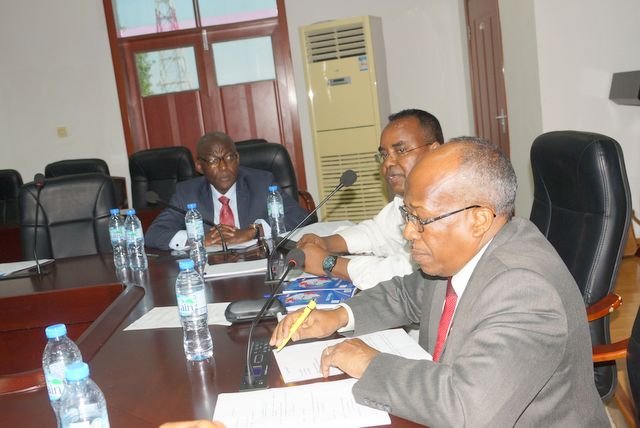
3-05-2016. Djibouti – IGAD senior management are holding a 5 day workshop with United Nations Economic Commission for Africa (UN -ECA) and African Union (AU) to engage in a dialogue with renowned experts from the renowned organizations on regional economic integration and cooperation in the IGAD region from May 2-5, 2016 in Djibouti.
The workshop was organized by IGAD Capacity Building Office in collaboration UNECA Capacity Building Division. In his introduction remarks Mr. Farah Abdulsamed, IGAD Capacity Building Coordinator told the participants that the objective of the workshop is to enhance staff capacity to meet the goals of IGAD as RECs as well as AU aspiration to realize its Agenda 2063. The workshop is one of series trainings expected to develop senior staff knowledge on key issues of regional economic integration.
The opening of the workshop was presided over by Mr. Elsadiq Abdalla, the Director of Economic Cooperation & Social Development Division (ECSD) who applauded UNECA for following their mandate to provide technical support to IGAD for them to realize the IGAD Integration Plan and IGAD Tourism Master Plan as well as for staff to effectively and efficiently undertake their tasks through the acquisition of knowledge that will be shared during the workshop.
The Principal Policy Adviser, Capacity Development Division at UNECA, Mr. Joseph Atta-Mensah, recognized IGAD as one of the building blocks and implementing arms of the African Union (AU) and for the significant progress made on the integration agenda, including cooperation in the areas of peace and security, socio-economic development, political integration and the harmonization of policies in the region.
Mr. Mensah during his presentation on ‘Overview of the Economy of Africa’ urged the team to look into ways through which IGAD can develop own strategies and plans based on the Goals of the Agenda 2063 for Member States to be self sustainable in implementation for project continuity.
He also encouraged IGAD to work together with other Regional Economic Communities (RECs) by harmonizing and coordinating programmes and activities to avoid overlapping, speeding up the process of all non physical and non tariff barriers to improve Intra-African trade as well as share information and experiences for an African Economic Community.
However, there are challenges to achieving these due to namely but not limited to; peace and security in the IGAD region, weak political will, fiscal deficit in agricultural prices, high poverty rates, over population, unemployment, conflict, limited movement of goods and persons, lack of technology and adaptation, lack of infrastructure, lack of entrepreneurial skills, limited energy and human capacity, limited support for private sector to name but a few.
Regional cooperation is undoubtedly intensifying in many parts of the world due to catalytic events and as a policy response to the acceleration of economic relations beyond borders.
The participants and experts will have an opportunity to interact and exchange views as well as have plenary discussions and working groups on different topics that include; Industrialization and Development, Continental Free Trade Area and Economic Diversification and Boosting Intra-African Trade, Trade Facilitation, Continental Infrastructure and Conflict on Development among many others.
The expected accomplishments at the end of the workshop include; a) Improved knowledge about the key topics relevant to IGAD mandates of regional integration processes and structures required to put in place related to institutional mandates b) Improved knowledge and skills required delivering institutional mandates of regional economic institution and technical capacities to deliver policies and implementing c) Enhanced awareness of integrated approaches for the development and implementation of regional strategies through the hastened economic, social and peace and security.
A report will be compiled on the outcome of the workshop which will be followed by actions by IGAD/UNECA on how best to have an IGAD region that can add value to existing agricultural crops , improved energy and ICT, Member States to provide infrastructure and an environment where private sector can thrive, trade policy framework for industrialization, build institutions that will improve business environment, economic governance and macro-economic management, harmonize policies between member states for free movement of people and goods, strengthen existing bi-lateral collaboration and integration between the IGAD Member States as well as provide support for agro business for food security and rural development
